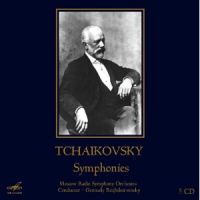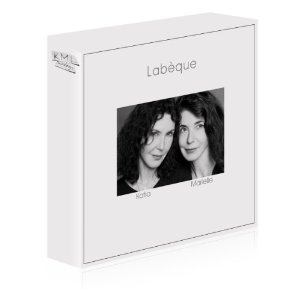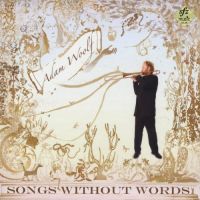Classical CDs Weekly: Handel, Russians, Labèques, Sackbuts | reviews, news & interviews
Classical CDs Weekly: Handel, Russians, Labèques, Sackbuts
Classical CDs Weekly: Handel, Russians, Labèques, Sackbuts
Our new Saturday CD review includes an oratorio and piano-playing sisters boxed
There is a change to our coverage of classical CD releases. Since theartsdesk began in September 2009, we have been reviewing on a monthly basis. As of today we're switching to weekly and our round-up of the new classical albums will now appear every Saturday. To mark the change, we have a bumper helping, with Tansy Davies's new release taking a bow as our Disc of the Day. As for the rest, there's a Russian flavour – historic, idiomatic performances of Tchaikovsky symphonies, and exciting readings of Shostakovich piano concertos. Enjoy French sisters playing piano duets and a glorious Handel oratorio, and be soothed by the most alluring of sackbut recitals.
Handel: Alexander’s Feast Ludus Baroque/Richard Neville-Towle (Delphian)
Handel’s 1736 oratorio with its text by John Dryden was a massive contemporary success and did much to establish the composer’s reputation in London. Dryden’s 1697 ode tells of the ability of Alexander the Great’s court musician Timotheus to charm and manipulate his audience through the beauty of his playing; it’s a celebration of the positive power of music. Alexander’s Feast sounds terrific in this effervescent recording from Richard Neville-Towle’s Edinburgh-based Ludus Baroque. Rhythms are nicely sprung, period-instrument textures are ideally transparent and the sense of fun is palpable; I write as one whose previous experience of Handel oratorio was limited to soggy renditions of Messiah highlights. Now I’m a convert.
Orchestral details emerge with pristine clarity – the juddering lower strings as the tenor sings of beating drums in The Praise of Bacchus, or the braying natural horns in the chorus which follows. The libretto is barely necessary, so good is the diction of chorus and soloists - Sophie Bevan’s soprano and William Berger’s bass as impressive as Ed Lyon’s pure-toned tenor. Music is described in the closing chorus as "the greatest blessing". Listen to these discs and dare to disagree.
 Shostakovich: Piano Concertos, Piano Quintet Martin Helmchen (piano), London Philharmonic Orchestra/Jurowski (LPO)
Shostakovich: Piano Concertos, Piano Quintet Martin Helmchen (piano), London Philharmonic Orchestra/Jurowski (LPO)
Start with the coupling, a studio recording of Shostakovich’s 1940 Piano Quintet, a perfectly balanced blend of wit, poise and profundity. From the opening Neo-Classical flourish to its haunting, drily ironic close, this performance impresses. Martin Helmchen takes the work seriously and urges us to do the same. He’s beautifully accompanied by the LPO’s principal string players – I’d urge you to listen to Pieter Schoeman’s immaculate slow violin solo in the Intermezzo. The intonation is perfect, the effect quietly shattering.
Helmchen’s live readings of the two contrasting concertos are similarly deadpan. The Neo-Classical writing in the 1933 Piano Concerto No 1 is dispatched with an appealing dryness and lack of irony. Paul Beniston’s obbligato trumpet solos can be heartbreaking in their poignancy, particularly near the close of the Lento. And I’ve never heard the slapstick close sound this cheerless. The 1957 Second Concerto, dismissed by its composer as musically worthless, sounds far more serious than usual in Helmchen and Jurowski’s hands. Piccolo and side drum are more prominent, insistent ostinati more nagging. The lovely, nostalgic Andante offers respite before the last movement’s 7/8 rhythms unsettle instead of entertain us. Intelligent performances of fascinating, accessible works.
Watch Jurowski and Helmchen play Shostakovich
 Tchaikovsky: Symphonies 1-6 Moscow Radio Symphony Orchestra, Gennady Rozhedestvensky (Melodiya)
Tchaikovsky: Symphonies 1-6 Moscow Radio Symphony Orchestra, Gennady Rozhedestvensky (Melodiya)
Another slab of thrilling Cold War-era music-making reissued by the Russian label Melodiya. Even the packaging is old school, with badly translated sleeve notes and a cardboard box already showing signs of strain. This is still an amazing bargain; these performances were recorded in the early 1970s and capture a truly authentic Russian playing style – weighty, dark strings, eloquent earthy winds and brass playing of raw power. Start with the Pathétique’s first movement, and the terrifying, primeval roar emitted by Rozhedestvensky’s trombones before the second theme’s reprise. It’s only matched by Mravinsky’s famous 1960s version, now on DG. The vibrato-heavy horn solo in the Fifth won’t be to everyone’s taste, but it’s a sound that Tchaikovsky must have known. The pizzicato strings in the scherzo of the Fourth are a delight, and the passage in the last movement when the doomy brass fanfares return is magnificently managed, allowing us a properly affirmative conclusion.
The early symphonies aren’t played as lightweights. Rozhdestvensky has taught me to love the Third in particular, with its three balletic inner movements framed by unbuttoned major-key outer ones. The First allows some idiomatic-sounding Soviet winds to shine, with bassoon solos to die for. You’ll like this set. And then you’ll be tempted to splash out on this team’s 1960s cycle of the complete Prokofiev symphonies – in cruder sound, but equally involving.
Watch Rozhdestvensky and the Leningrad Philharmonic perform Tchaikovsky
 Katia & Marielle Labèque (KML Recordings)
Katia & Marielle Labèque (KML Recordings)
This is a glossily produced five-disc box with bonus DVD collecting some of the Labèque sisters’ recent own-label recordings, in which the quality of the music-making justifies the flash packaging. The Ravel disc includes beguiling versions of the Rhapsodie Espagnole and Ma Mère l’Oye in two-piano and piano duet form, the percussion added to Ravel’s transcription of Boléro supplying extra spice. Those peculiar bitonal harmonies have added bite, and the steadiest of crescendos is skillfully managed. A disc of Schubert and Mozart is good but without quite reaching the heights of Steven Osborne and Paul Lewis’s recent Hyperion recording. A generous collection of Satie miniatures fills another disc, in which the solo piano works are shared between Katia and Marielle. They’re wonderfully played, though too often with Satie I find the titles more entertaining than the Minimalist doodlings. Still, what is there not to love about a composer who can call a work Véritables préludes flasques pour un chien?
De fuego y de agua, a collection of Lorca settings by composers including de Falla, Rodrigo and Granados, is high-quality crossover which comes off beautifully, Mayte Martín’s expressive, not-too-polished voice blending impeccably with the piano accompaniments. Best of all is the Stravinsky and Debussy disc – a rare chance to enjoy Stravinsky’s witty 1935 Concerto for Two Pianos, written for the composer to play with his son. In amongst the spikier miniatures (including a two-piano arrangement of the wonderful 1940 Tango) the Labèques give us a nicely brooding account of Debussy’s En blanc et noir.
The Labèques and Mayte Martin perform
 Adam Woolf: Songs Without Words (SFZ Music)
Adam Woolf: Songs Without Words (SFZ Music)
Adam Woolf is a long-serving member of His Majesty’s Sackbuts & Cornetts, and this solo recital consists of transcriptions of 16th and 17th-century vocal music. The sackbut follows the vocal line exactly, or adds ornamentation to create virtuoso display pieces. The results are unexpectedly mellifluous and I was unprepared for the panache of Woolf’s playing. It’s like a softer, mellower trombone sound, and the sleeve note quotes period sources praising 17th-century sackbut players who could match the agility and range of singers. Woolf’s technique never draws attention away from the music he’s chosen, or the idiomatic accompaniments on organ, theorbo, harpsichord or viola da gamba.
The slower pieces are especially successful - Schütz’s O Jesu nomen dulce with its lilting harp and theorbo backing, or Van Eyck’s mournful Dowland-influenced Pavane lachrymae, the only work on the disc played without accompaniment.
Watch Adam Woolf perform
Share this article
more Classical music
 Watts, BBC Symphony Orchestra and Chorus, Bignamini, Barbican review - blazing French masterpieces
Poulenc’s Gloria and Berlioz’s 'Symphonie fantastique' on fire
Watts, BBC Symphony Orchestra and Chorus, Bignamini, Barbican review - blazing French masterpieces
Poulenc’s Gloria and Berlioz’s 'Symphonie fantastique' on fire
 Bell, Perahia, ASMF Chamber Ensemble, Wigmore Hall review - joy in teamwork
A great pianist re-emerges in Schumann, but Beamish and Mendelssohn take the palm
Bell, Perahia, ASMF Chamber Ensemble, Wigmore Hall review - joy in teamwork
A great pianist re-emerges in Schumann, but Beamish and Mendelssohn take the palm
 First Persons: composers Colin Alexander and Héloïse Werner on fantasy in guided improvisation
On five new works allowing an element of freedom in the performance
First Persons: composers Colin Alexander and Héloïse Werner on fantasy in guided improvisation
On five new works allowing an element of freedom in the performance
 First Person: Leeds Lieder Festival director and pianist Joseph Middleton on a beloved organisation back from the brink
Arts Council funding restored after the blow of 2023, new paths are being forged
First Person: Leeds Lieder Festival director and pianist Joseph Middleton on a beloved organisation back from the brink
Arts Council funding restored after the blow of 2023, new paths are being forged
 Classical CDs: Nymphs, magots and buckgoats
Epic symphonies, popular music from 17th century London and an engrossing tribute to a great Spanish pianist
Classical CDs: Nymphs, magots and buckgoats
Epic symphonies, popular music from 17th century London and an engrossing tribute to a great Spanish pianist
 Sheku Kanneh-Mason, Philharmonia Chorus, RPO, Petrenko, RFH review - poetic cello, blazing chorus
Atmospheric Elgar and Weinberg, but Rachmaninov's 'The Bells' takes the palm
Sheku Kanneh-Mason, Philharmonia Chorus, RPO, Petrenko, RFH review - poetic cello, blazing chorus
Atmospheric Elgar and Weinberg, but Rachmaninov's 'The Bells' takes the palm
 Daphnis et Chloé, Tenebrae, LSO, Pappano, Barbican review - lighting up Ravel’s ‘choreographic symphony’
All details outstanding in the lavish canvas of a giant masterpiece
Daphnis et Chloé, Tenebrae, LSO, Pappano, Barbican review - lighting up Ravel’s ‘choreographic symphony’
All details outstanding in the lavish canvas of a giant masterpiece
 Goldscheider, Spence, Britten Sinfonia, Milton Court review - heroic evening songs and a jolly horn ramble
Direct, cheerful new concerto by Huw Watkins, but the programme didn’t quite cohere
Goldscheider, Spence, Britten Sinfonia, Milton Court review - heroic evening songs and a jolly horn ramble
Direct, cheerful new concerto by Huw Watkins, but the programme didn’t quite cohere
 Marwood, Power, Watkins, Hallé, Adès, Bridgewater Hall, Manchester review - sonic adventure and luxuriance
Premiere of a mesmeric piece from composer Oliver Leith
Marwood, Power, Watkins, Hallé, Adès, Bridgewater Hall, Manchester review - sonic adventure and luxuriance
Premiere of a mesmeric piece from composer Oliver Leith
 Elmore String Quartet, Kings Place review - impressive playing from an emerging group
A new work holds its own alongside acknowledged masterpieces
Elmore String Quartet, Kings Place review - impressive playing from an emerging group
A new work holds its own alongside acknowledged masterpieces
 Gilliver, LSO, Roth, Barbican review - the future is bright
Vivid engagement in fresh works by young British composers, and an orchestra on form
Gilliver, LSO, Roth, Barbican review - the future is bright
Vivid engagement in fresh works by young British composers, and an orchestra on form
 Josefowicz, LPO, Järvi, RFH review - friendly monsters
Mighty but accessible Bruckner from a peerless interpreter
Josefowicz, LPO, Järvi, RFH review - friendly monsters
Mighty but accessible Bruckner from a peerless interpreter

Add comment